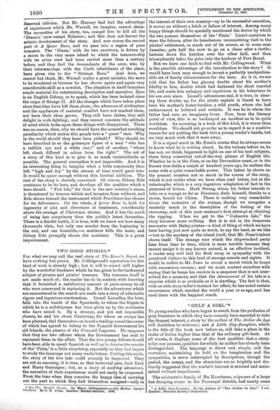TWO GOOD STORMS.* FOR what we may call the real
story of The Lover's Secret, we have nothing but praise. Mr. Collingwood's reputation for this kind of work is already high ; but it will be raised still higher by the wonderful freshness which he has given to the hackneyed subject of pirates and pirates' treasure. The treasnre itself is not made mach of ; the reader has to be content with knowing that it furnished a satisfactory amount of prize-money to all who were concerned in capturing it. But the adventures which are encountered in the search are made into a story of admirable vigour and ingenious construction. Lionel Lascelles, the hero, falls into the hands of the Spaniards, to whom the frigate in which he is a midshipman has been given up by the mutineers who have seized it. By a strange, and yet not impossible chance, he and his chum Conrtenay, for whom an escape has been planned, find themselves on board a tradiog-vessel the owner of which has agreed to betray to the Spanish Government his old friends, the pirates of the Conconil Lagoons. He supposes that they are two Offieers whom the Government has sent to represent them in the affair. That the two young fellows should have been able to speak Spanish so well as to deceive the master of the' Pinta,' is a little surprising, especially as they had begun to study the language not many weeks before. Putting this aside, the story of the two lads could scarcely be improved. They are not as amusing, it is true, as that immortal pair, Jack Easy and Harry Gascoigne ; but, as a story of exciting adventure, the narrative of their experiences could not easily be surpassed. From the time when they conceive the happy idea of carrying out the part to which they find themselves assigned—only in
cit.tg,;)e.n. `nySGFINSe:n.".Le3113/eninrY Cguidgar.d.—(.2‘) Mother C*"11..
the interest of their own country—up to its successful execution, it moves on without a hitch or failure of interest. Among many happy things should be specially mentioned the device by which the two possess themselves of the ` Lionel contrives to steer the felucca, after its treacherous reconnoitring visit to the pirates' settlement, so much out of its course, as to come near Jamaica ; gets half the crew to go on a chase after a turtle; battens down the hatches over the other half, and then triumphantly takes his prize into the harbour of Port Royal.
But we have one fault to find with Mr. Collingwood. What is the possible advantage of the introduction to the Wry? It would have been easy enough to invent a perfectly unobjection- able set of family circumstances for the hero. As it is, we are told that his father has gloomy doubts about his mother's fidelity to him, doubts which had darkened his short married life, and made him unhappy and capricious in his behaviour to his son ever since. Lionel's adventures end, it is true, in clear- ing these doubts up, for the pirate captain is found to have been his mother's foster-brother, a wild youth, whom she had endeavoured to befriend and reclaim. It was he in whom the father had seen an imaginary lover. Now, from the literary point of view, this is so hackneyed an incident as to be quite worthless. As occurring in a book of this kind, it is worse than worthless. We should not go gofer as to regard it as a positive reason for not putting the book into a young reader's hands, but we very much wish that it were away.
It is a signal merit in Mr. Fean'e stories that he always seems to know what he is writing about. In the volume before us, he has not, we think, happened to light on one of his best subjects, these being somewhat out-of-the-way phases of English life. Whether he is in the Fens, or on the Devonshire coast, or in the Sussex iron-fields a couple of hundred years ago, he realises the scene with a quite remarkable power. This talent he shows on the present occasion not so much in the course of the story, which is not unlike what we have often read before, but in the catastrophe, which is a very ingenious adaptation of fact to the purposes of fiction. Mark Strong, whom his father intends to take on a voyage as far as Penzance, finds himself, thanks to a storm, bound for China. There is nothing very remarkable about the narrative of the voyage, though we recognise a masterly touch in the description of the finding of the stowaway, and of this poor creature's first attempt at climbing the rigging. When we get to the "Unknown Isle," the story becomes more exalting. But it is not in the desperate encounter with Malay pirates—a kind of thing of which we have been having just now quite as much, to say the least, as we like —but in the mystery of the island itself, that Mr. Penn's talent shows itself. The strange roar which the shipwrecked party hear from time to time, which is more terrible because they cannot assign it to any known animal, is an effective incident. A reader may well feel his flesh creep in sympathy with the perplexed visitors to this land of strange sounds and sights. It would be unfair to Mr. Fenn to reveal a secret which he keeps with uncommon success ; and we must content ourselves with saying that he keeps his readers in a suspense that is not inter- mitted for a moment, and that the denouement of his tale is a surprise which is as probable as it is startling. The fact is that, with an able story-teller's instinct for effect, he has noted certain occurrences which startled the world a year or so ago, and has used them with the happiest result.






















































 Previous page
Previous page